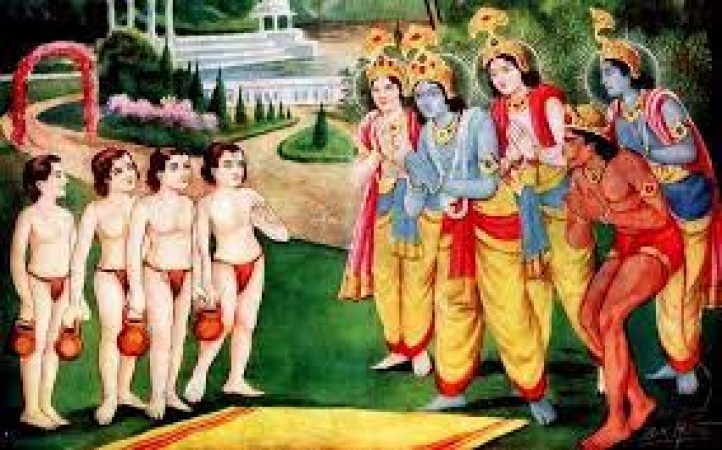
In the vast realm of Hindu mythology and spiritual traditions, the Four Kumaras hold a unique and revered place. Also known as the Sanat Kumaras or Chatur Kumaras, they are the four eternal youths who play a significant role in the cosmology and spiritual teachings of ancient Indian scriptures. The Four Kumaras are the mind-born sons of Lord Brahma, the creator deity in Hinduism. According to the Puranas, they were born directly from Brahma's mind, and due to their purity and spiritual wisdom, they attained a state of eternal youth. As a result, they are often depicted as young boys, although they possess profound spiritual knowledge and wisdom beyond their appearance. The names of the Four Kumaras are Sanaka, Sanandana, Sanatana, and Sanatkumara. Each Kumar possesses unique characteristics, yet they share the common trait of embodying pure consciousness and detachment from material desires. They are revered as spiritual masters and saints, who are eternal seekers of divine wisdom and truth.
The story of the Four Kumaras is intricately linked to their profound spiritual journey and their quest for enlightenment. In their desire to remain celibate and detached from worldly desires, they chose not to create progeny, which led to a lack of future generations to maintain the cosmic order. Their resolution to remain eternal youths is rooted in their unwavering devotion to divine knowledge and their aspiration to remain focused on their spiritual path. Their exceptional spiritual wisdom and quest for truth led them to be regarded as the foremost disciples of Lord Shiva. The Four Kumaras approached Shiva as naked ascetics, reflecting their absolute renunciation of material possessions and identification with the physical body. However, Shiva, recognizing their deep devotion and purity of heart, welcomed them as his foremost disciples and imparted to them the esoteric teachings of spiritual truths. The Four Kumaras are also known for their confrontation with Lord Vishnu in his form as Vaikuntha Narayana. Once, the Kumaras desired to visit Lord Vishnu's celestial abode, Vaikuntha. However, the gatekeepers, Jaya and Vijaya, stopped them as they appeared as young boys. Filled with righteous anger and unable to bear the indignity, the Four Kumaras cursed Jaya and Vijaya to be born as demons on Earth. This event is believed to be a part of the divine leelas (play) of Vishnu, showcasing the interplay of dharma (righteousness) and the karmic consequences.
The Four Kumaras are regarded as epitomes of Bhakti (devotion) and Jnana (knowledge). Their teachings emphasize the importance of self-realization, non-attachment, and devotion to the divine. They exemplify the pursuit of inner truth and the renunciation of material desires, leading seekers on the path of liberation and spiritual evolution. Their teachings and wisdom have been widely revered and incorporated into various spiritual traditions and philosophical systems in Hinduism. Their stories and interactions with divine beings are recounted in the Puranas and other sacred texts, leaving a lasting impact on the spiritual landscape of India.
In conclusion, the Four Kumaras stand as eternal youths and spiritual masters in Hindu mythology. Born directly from the mind of Lord Brahma, they embody pure consciousness and spiritual wisdom beyond their youthful appearance. Their unwavering devotion to the divine and quest for truth has earned them the status of foremost disciples of Lord Shiva. The Four Kumaras continue to be revered as symbols of devotion and wisdom, guiding seekers on the path of self-realization and spiritual enlightenment. Their stories and teachings continue to inspire and influence spiritual seekers, leaving an enduring legacy in the rich tapestry of Hindu mythology and philosophy.
Also read - Rishabha Avatar of Vishnu: The Divine Incarnation of Asceticism and Spiritual Enlightenment